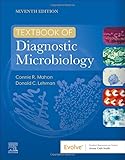Textbook of diagnostic microbiology / edited by Connie R. Mahon, Donald C. Lehman.
Material type: TextEdition: Seventh editionDescription: xii, 1105 pages : illustrations (chiefly color) ; 29 cmISBN:
TextEdition: Seventh editionDescription: xii, 1105 pages : illustrations (chiefly color) ; 29 cmISBN: - 9780323829977
- QR67.T49 2023
| Item type | Current library | Call number | Status | Date due | Barcode | |
|---|---|---|---|---|---|---|
 Books
Books
|
KMTC:NAIROBI CAMPUS General Stacks | QR67.T49 2023 (Browse shelf(Opens below)) | Available | 31711 |
Contents:
Part I: Introduction to clinical microbiology. Bacterial cell structure, physiology, metabolism, and genetics
Host-parasite interaction
The laboratory role in infection control
Control of microorganisms: disinfection, sterilization, and microbiology safety
Performance improvement in the microbiology laboratory
Specimen collection and processing
Microscopic examination of materials from infected sites
Use of colony morphology for the presumptive identification of microorganisms
Biochemical identification of gram-negative bacteria
Immunodiagnosis of infectious diseases
Applications of molecular diagnostics
Antibacterial mechanisms of action and bacterial resistance mechanisms
Antimicrobial susceptibility testing
Part II: Laboratory identification of significant isolates. Staphylococcus and similar organisms
Streptococcus, enterococcus, and other catalase-negative, gram-positive cocci
Aerobic gram-positive bacilli
Neisseria species and moraxella catarrhalis
Haemophilus, HACEK group, legionella and other fastidious gram-negative bacilli
Enterobacterales
Vibrio, aeromonas, campylobacter, and campylobacter-like species
Nonfermenting and miscellaneous gram-negative bacilli
Anaerobes of clinical importance
The spirochetes
Chlamydia, rickettsia, and similar organisms
Mycoplasma and ureaplasma
Mycobacterium tuberculosis and nontuberculous mycobacteria
Medically significant fungi
Diagnostic parasitology
Clinical virology
Agents of bioterror and forensic microbiology
Biofilms: architects of disease
Part III: Laboratory diagnosis of infectious diseases: and organ system approach to diagnostic microbiology. Upper and lower respiratory tract infections
Skin and soft tissue infections
Gastrointestinal infections and food poisoning
Infections of the central nervous system
Bacteremia and sepsis
Urinary tract infections
Genital infections and sexually transmitted infections
Infections in special populations
Zoonotic diseases
Ocular infections
Appendix A: Answers to learning assessment questions
B: Selected bacteriologic culture media
C: Selected mycology culture media, and stains
D: Selected procedures
Gain the knowledge and skills you need to succeed in the clinical lab! Textbook of Diagnostic Microbiology, 7th Edition uses a reader-friendly "building-block" approach to help you
There are no comments on this title.

